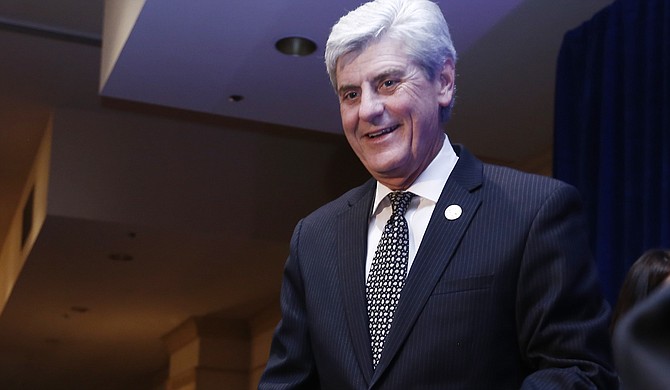Gov. Phil Bryant has publicly said he will do everything possible to refuse Syrian refugees from entering Mississippi, following the terrorist attacks in Paris. Photo by Imani Khayyam.
Gov. Phil Bryant joined several governors on Monday in pledging to refuse Syrian refugees should they be sent to Mississippi following the terrorist attacks in Paris that left 129 people dead and hundreds more wounded.
The governors say they are responding to heightened concerns that terrorists might use the refugees as cover to sneak across borders. Last week, authorities said a Syrian passport was found near one of the attackers on Friday, according to an Associated Press report. The Paris prosecutors' office also said fingerprints from the attacker match those of an individual who passed through Greece in October.
However, refusing refugees is not as simple as Bryant and his gubernatorial colleagues seem to think.
President Barack Obama has pledged to accept about 10,000 Syrian refugees and argued Monday that the United States needs to allow them because many are fleeing terrorism, and that they would undergo rigorous security checks before being admitted to the U.S.
"We also have to remember that many of these refugees are the victims of terrorism themselves. That’s what they’re fleeing,” Obama said at the G20 Summit on Monday. “Our nations can welcome refugees who are desperately seeking safety. And ensure our own security. We can and must do both.”
When refugees arrive in the U.S., they receive federal support as they transition into their new lives. After one year in the U.S., they can apply for permanent residency. The federal government controls how the refugee program runs, so state governors would have a difficult time refusing refugees, said Lavinia Limon, president and CEO of the U.S. Committee for Refugees and Immigration on a conference call Tuesday.
In fact, the only action governors could take is refusing the federal funds to help newly arrived refugees, according to Limon. If this happens, the U.S. Department of Health and Human Services is required to name another agency to help distribute and administer support to the refugees (if the state agencies won’t help).
Bryant said in a statement that he is working with the Mississippi Department of Public Safety and the Mississippi Office of Homeland Security to determine the "current status" of any Syrian refugees that could be coming to Mississippi in the future.
Beyond refusing funds, depending on how governors act on their statements, refusing services to a group of people based on ethnicity or nationality could be a discriminatory practice that would not hold up in court, said to Linda Hartke, president of Lutheran Immigration and Refugee Service, who also spoke on the conference call about refugee procedures and regulations in the U.S.
“Some of the statements made (by governors) sound highly discriminatory,” Hartke said in during the press conference call. “More seriously, it creates a climate of fear in a community.”
In the past three years, a little more than 2,000 Syrian refugees have been re-settled in the U.S. Limon believes that a state agency's refusal of services to a Syrian refugee because Syria is their nation of origin would be a violation of the law.
“It would be pretty amazing for a governor to decide to discriminate in the provision of services based on ethnicity or racial makeup,” she said.
Gov. Bryant has not changed his stance on refugees entering Mississippi. Monday night, he appeared on the Fox Business channel to defend his position. Bryant told Lou Dobbs, the host and vocal critic of Obama's immigration policies, that he has reached out to the Mississippi Congressional delegation to push for state authority to change the refugee laws, if necessary.
“I am concerned about the people of the state of Mississippi and the safety of Americans,” Bryant said.
Limon said that more refugees have entered the U.S. under Republican presidential leadership than under a Democratic president. President George H.W. Bush accepted the most refugees into the country of any leader after the Refugee Act of 1980 which established the rules and procedures for refugees entering the country, according to Limon.
Since the Congress passed the Refugee Act of 1980, the refugee program has undergone several transformations for security reasons—including an overhaul after the Sept. 11 terrorist attacks on the World Trade Center and made additional modifications five years ago. No Syrian refugees have been placed in Mississippi this year, the AP reported.
Kevin Appleby, director of migration policy for the U.S. Conference of Catholic Bishops, said the U.S. refugee program has no history of security breeches resulting in coordinated, violent attacks—and that track record shows the program is pretty secure.
“What’s confusing to me as a U.S. citizen is why we’re focusing on this population when there are easier ways to get into the country,” Appleby said.
Limon pointed out that businessmen, students and tourists go through much less stringent security procedures, and even within the refugee program, refugees are processed based on the need, in other words, those that are most vulnerable are the priority for her office.
“We take refugees who are at real risk,” Limon said on a press conference Tuesday. “We’re talking about women who are widows, older people, ill people and children—the program is designed to help those people first.”
Hartke said that closing our doors to refugees is bowing to the fear that the Islamic State wants.
“To close the door on resettling Syrian refugees would be nothing less than signing a death warrant for tens of thousands of people,” she said.



Comments
Use the comment form below to begin a discussion about this content.